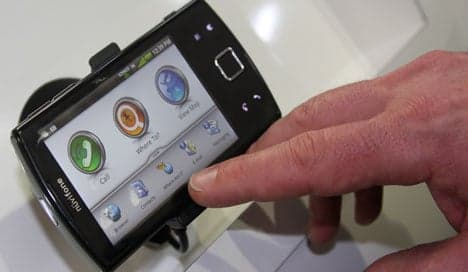After 3G hype, 4G frequencies to go on auction in Germany

A decade ago, telecoms paid big to snap up 3G mobile licenses and later regretted it. Now in Germany, the next generation 4G frequencies are about to go up for auction.
In 2000, at the height of the tech bubble, telecom operators fell over themselves to snap up 3G or third generation mobile licenses in an auction in Germany.
In the hangover that followed, successful bidders were left drowning in a sea of debt, and 3G, once it eventually got off the ground, proved something of a disappointment.
Ten years on, it is the turn of 4G frequencies to go under the hammer in the western city of Mainz on Monday. But the German government expects to reap only a fraction of the €50 billion ($67 billion) it received last time.
But with the new technology promising nothing less than a revolution, interest among firms like Britain's Vodafone and T-Mobile is strong, with analysts predicting a windfall of €5 to €10 billion for Berlin.
This time around, operators are confident too that the technology will not disappoint and that it will be in the hands of consumers a lot sooner.
"Demand is well ahead of supply," said Matthias Kurth, head of the German telecoms regulator running the auction, with "severe competition" among operators like Vodafone and T-Mobile to grab a piece of the 4G pie.
In Europe's first 4G auction, a large part of what is up for grabs is the so-called "digital dividend," a chunk of frequencies left unwanted by television companies following their switch from analogue to digital broadcasting.
The 4G technology, known as Long Term Evolution (LTE), will mean that using your mobile handset just to phone people will become old hat since it will allow data to be transferred at breakneck speeds.
The resulting downloading capacities will make the mobile phone a powerful tool for surfing the Internet. Phone calls, too, will occur by Internet telephony, as happens on PCs now with programs like Skype.
Another advantage for both firms and users of the new technology will be that remote areas currently with little or no high-speed Internet will soon be covered.
And with experts predicting a price war among operators, consumers may start to wonder whether they still need a mobile phone operator as well as a fixed net provider, since home computers could use the networks too.
"With LTE, mobile phone networks will become a real alternative to cable or DSL (broadband telephone connections)," said Herbert Merz, head of the German hightech association Bitkom.
Comments
See Also
In 2000, at the height of the tech bubble, telecom operators fell over themselves to snap up 3G or third generation mobile licenses in an auction in Germany.
In the hangover that followed, successful bidders were left drowning in a sea of debt, and 3G, once it eventually got off the ground, proved something of a disappointment.
Ten years on, it is the turn of 4G frequencies to go under the hammer in the western city of Mainz on Monday. But the German government expects to reap only a fraction of the €50 billion ($67 billion) it received last time.
But with the new technology promising nothing less than a revolution, interest among firms like Britain's Vodafone and T-Mobile is strong, with analysts predicting a windfall of €5 to €10 billion for Berlin.
This time around, operators are confident too that the technology will not disappoint and that it will be in the hands of consumers a lot sooner.
"Demand is well ahead of supply," said Matthias Kurth, head of the German telecoms regulator running the auction, with "severe competition" among operators like Vodafone and T-Mobile to grab a piece of the 4G pie.
In Europe's first 4G auction, a large part of what is up for grabs is the so-called "digital dividend," a chunk of frequencies left unwanted by television companies following their switch from analogue to digital broadcasting.
The 4G technology, known as Long Term Evolution (LTE), will mean that using your mobile handset just to phone people will become old hat since it will allow data to be transferred at breakneck speeds.
The resulting downloading capacities will make the mobile phone a powerful tool for surfing the Internet. Phone calls, too, will occur by Internet telephony, as happens on PCs now with programs like Skype.
Another advantage for both firms and users of the new technology will be that remote areas currently with little or no high-speed Internet will soon be covered.
And with experts predicting a price war among operators, consumers may start to wonder whether they still need a mobile phone operator as well as a fixed net provider, since home computers could use the networks too.
"With LTE, mobile phone networks will become a real alternative to cable or DSL (broadband telephone connections)," said Herbert Merz, head of the German hightech association Bitkom.
Join the conversation in our comments section below. Share your own views and experience and if you have a question or suggestion for our journalists then email us at [email protected].
Please keep comments civil, constructive and on topic – and make sure to read our terms of use before getting involved.
Please log in here to leave a comment.